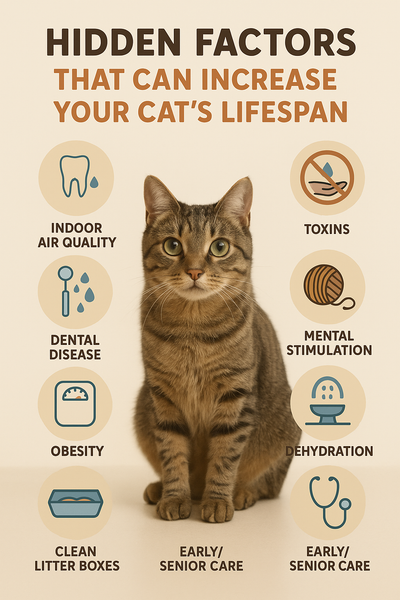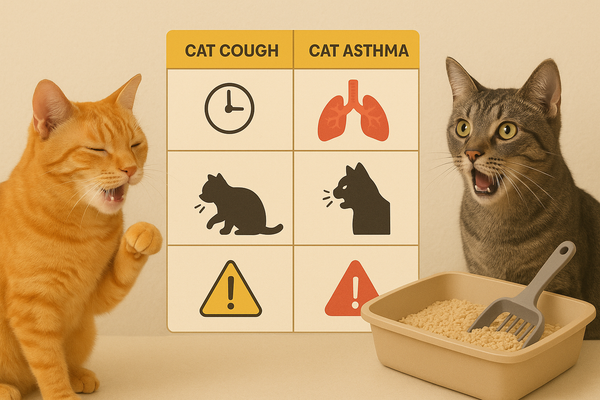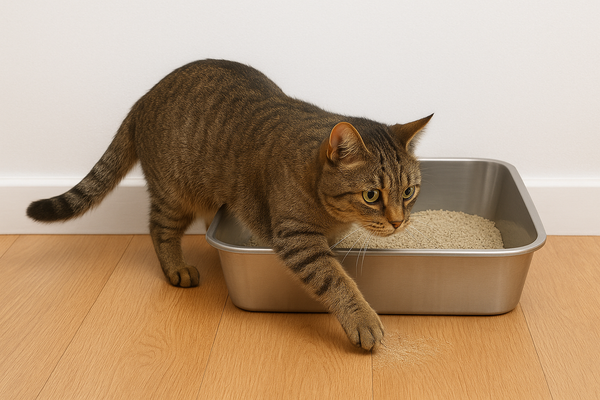Why Do Cats Get Asthma? A Cat Owner’s Perspective

As a devoted cat owner, understanding your feline friend’s health is essential, especially when it comes to managing conditions like asthma. While it can sound concerning, the great news is that most cats with asthma can still lead happy, comfortable lives with the right care and attention. If you’ve noticed your cat wheezing or coughing more than usual, it could be a sign of asthma. Let’s dive into why cats get asthma and how to manage it—especially as the cold weather sets in!
What Is Cat Asthma?
Cat asthma is a respiratory condition where the airways become inflamed and narrow, making it difficult for your cat to breathe. This leads to coughing, wheezing, and shortness of breath, particularly during flare-ups. While asthma can’t be cured, with proper care, it can be effectively managed, allowing your cat to live a happy and healthy life.
Why Do Cats Get Asthma?
Several factors can contribute to asthma in cats. Understanding these causes helps us as pet owners make adjustments to better manage the condition:
-
Genetics: Some cats are simply more predisposed to asthma due to their genetic makeup. Breeds like Siamese cats are particularly known to be at higher risk.
-
Environmental Allergens: Cats can develop asthma in response to allergens in their environment. Dust, pollen, mold, or strong chemical odors (like cleaning products or perfumes) can irritate their lungs and lead to asthma symptoms.
-
Tobacco Smoke: Just like humans, cats exposed to cigarette smoke are at an increased risk of respiratory issues, including asthma. It’s important to keep your cat away from smoke-filled environments to protect their lungs.
-
Obesity: Overweight cats are more likely to suffer from respiratory problems, including asthma. Maintaining a healthy weight through proper diet and regular exercise can help reduce this risk.
-
Respiratory Infections: Previous respiratory infections can leave a cat’s airways more sensitive and prone to asthma. If your cat has had a cold or other respiratory issues in the past, it might increase the likelihood of asthma developing.
-
Rainy Season: The colder months can also contribute to asthma flare-ups in cats. Just like humans, cold air can trigger or worsen asthma symptoms, especially if your cat is already prone to respiratory issues. The cold air from rainy weather can cause the airways to constrict, leading to difficulty breathing. It's essential to keep your cat warm and avoid exposure to air conditioner as much as possible.
- Dusty Cat Litter: Using dusty cat litter like bentonite can contribute to the development or worsening of asthma in cats because the fine particles released into the air can irritate their sensitive lungs. When a cat breathes in this dust, it can trigger inflammation in the airways, making it harder for them to breathe and potentially leading to coughing, wheezing, and asthma flare-ups. Over time, repeated exposure to dusty litter can increase the risk of chronic respiratory issues.
Managing Cat Asthma at Home
As a cat owner, the good news is that there are several steps you can take at home to manage your cat’s asthma and ensure their comfort. One effective tool that’s becoming increasingly popular is the portable nebulizer.
How Portable Nebulizers Can Help
Portable nebulizers are an excellent way to manage asthma in cats. They work by delivering a fine mist of medication directly into your cat’s lungs, helping to reduce inflammation and open up the airways. Here’s how you can use one:
-
Choose the Right Nebulizer: A portable nebulizer designed specifically for pets is an ideal choice. These devices are smaller, quieter, and more comfortable for your cat. Talk to your vet about the best model and the medication your cat will need.
-
Make it a Routine: Depending on your cat’s asthma severity, using a nebulizer regularly can significantly help reduce flare-ups. Your vet will recommend the correct schedule for nebulizer treatments.
-
Create a Calm Environment: Cats can be sensitive to new things, so it’s important to make the nebulizer experience as stress-free as possible. Use treats, calming music, and gentle petting to help your cat relax during the treatment. You might also want to start by just getting them used to the sound of the nebulizer before actually using it.
-
Proper Positioning: Place the nebulizer mask close to your cat’s face for an effective treatment. Some nebulizers come with a special pet mask that fits comfortably around your cat’s nose and mouth. Keep the session short (a few minutes) to prevent stress.
-
Humidity Control: A portable nebulizer can also help add moisture to the air, which is beneficial during rainy season when the air tends to be colder. Cold air can aggravate asthma symptoms, so having a little extra humidity can be soothing for your cat’s respiratory system.
Other Ways to Manage Asthma at Home
-
Maintain a Clean Environment: Keep your home free of dust, smoke, and other environmental triggers. Consider using air purifiers to reduce allergens in the air and vacuum regularly.
-
Control Weight: Ensure your cat stays at a healthy weight to support their overall health and lung function. A balanced diet and regular playtime can help prevent weight gain and reduce respiratory strain.
-
Warm and Cozy Spaces: During the rainy season, create warm, comfortable spots for your cat to rest. Avoid exposing them to cold air or drafts, which could trigger asthma flare-ups. Keeping the house warm and cozy will help their lungs stay relaxed.
- High Quality Cat Litter: To help protect your cat’s health, it’s important to choose a dust-free and unscented litter that minimizes airborne particles and promotes cleaner, safer breathing.
The Silver Lining: Cats Can Live Happy with Asthma
With the right treatment and care, cats with asthma can lead long, happy lives. Managing their asthma with portable nebulizers, creating a clean environment, and paying attention to triggers like rainy season can help them breathe easier and feel more comfortable. Most importantly, regular vet check-ups will ensure that their condition stays under control.
As a cat owner, it’s empowering to know that with a bit of extra attention, you can make a significant difference in your cat’s quality of life. So, if your cat is diagnosed with asthma, don’t worry! With love, care, and the right management, your furry friend can continue to enjoy snuggles, playtime, and all the joys of life.



